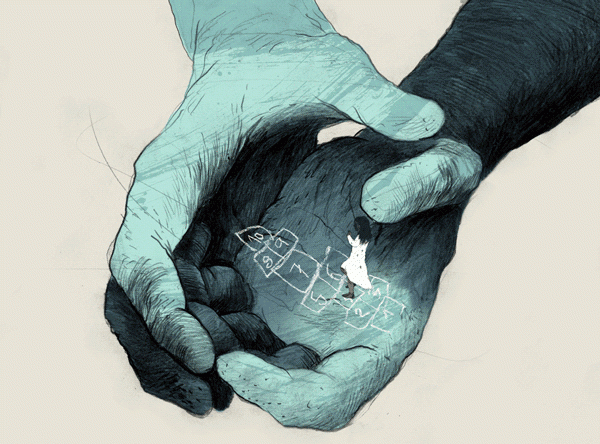Treat Your Children With Care: They Are Made of Dreams

Children have their own rhythm, their own way of feeling, seeing and thinking. Trying to substitute that with our own ways of feeling, seeing and thinking is one of the biggest mistakes people make, because children will never be copies of their parents. Children are the sons and daughters of the world and are made of the dreams and hopes that they are able to build in their free and privileged minds.
Not long ago, a rather disturbing piece of news came out. In the UK, many families prepare their five-year-old children so that at six they can take an entry exam for the top elite schools. A supposed “promising future” now goes hand in hand with missing out on childhood. Turning children that should be playing together in parks into “opponents”.
What is the use of a child that can tell us the names of all of Saturn’s moons but doesn’t know how to handle their sadness or anger? Let’s educate children to be emotionally wise, full of dreams and not of fears.
Currently, many mothers and fathers still hold the idea of “accelerating” the abilities of their children, by stimulating them cognitively, by playing Mozart while they are still asleep in the mother’s womb. Children of just five or six are already suffering from the stress of an adult.

Our children and the competitive environment
It’s clear to us all that in these changing and competitive societies, people who are capable of adapting to such demands are needed. Nor do we doubt that the British children who manage to get into the top elite schools will get good jobs in the future. However, it is also important to ask ourselves…
Will it have been worth all the emotional cost? Missing their childhood? Following the patterns their parents had programmed into them from the age of five?
It is worth mentioning that to date there are no conclusive studies that support the idea that “accelerating” certain competencies, like reading, in four-year-olds is positive or has a long-term effect on their academic performance. What it does achieve in many cases is that the children begin to discover experiences like frustration, stress and, above all, having to meet parental expectations.
Children are made of dreams and we have to treat them with care. If we insist on filling their time with objectives to meet and abilities to achieve, each day we will be breaking off a little bit of their wings. Those wings that the child needs to reach their own dreams. If we give them adult obligations when they are just children, we’ll end up ripping the wings off their kites, chaining them to the ground and making them miss their childhood.

Parenting that respects the timing, joys and dreams of the child
In this world of accelerated learning and abilities, we can also find other examples, which are now starting to gather greater momentum, such as “respectful parenting” and “slow parenting”. It’s worth mentioning that before choosing the acceleration path, it is always advisable to offer some first tries, for example offering books to children between three and five without forcing them to read or to start learning.
Our most important obligation with our children is to give them a “ray of light” and then to continue on our paths.
– Maria Montessori-
Curiosity is the greatest motivation of the child’s mind, so it is important for fathers, mothers and educators to act as facilitators of learning and not as agents of pressure. Now we’ll take a detailed look at these interesting parenting approaches that respect the child’s natural cycles and needs.

Slow parenting
Slow parenting is a true reflection of the social and philosophical trend that invites us to go more slowly, to be more conscious of what is around us. That’s why, when it comes to parenting, it promotes a more simple and patient model, respecting the rhythms of the child at each evolutionary stage.
The core ideas that define slow parenting are as follows:
- The basic need of a child is to play and discover the world.
- We are not the friends of our children, we are their mothers and fathers. Our task is to love them, guide them, be an example to them and facilitate their growth without pressuring them.
- Always remember that “more is less”. That creativity is a child’s weapon: a pencil, paper and a field are more powerful than a telephone or a computer.
- Share time with your children in calm spaces.
Respectful parenting
For sure you’ve already heard of respectful parenting. Although the most well-known aspect of this approach is the use of positive reinforcement over typical punishment or scolding, this educational style also encompasses many other dimensions that are worth bearing in mind.
- We should educate without shouting.
- The use of rewards is not always appropriate: we run the risk of our children getting used to always expecting to be rewarded without understanding the intrinsic benefit of their effort and personal achievement.
- Saying “no” and establishing limits will not cause them trauma but rather is necessary.
- Respectful parenting makes intense use of communication, listening and patience. A child that feels heard and valued is someone who feels free to sustain their childhood dreams and bring them to life as they grow up.
Let’s respect their infancy and respect this stage that offers roots to their hopes and wings to their expectations.
Children have their own rhythm, their own way of feeling, seeing and thinking. Trying to substitute that with our own ways of feeling, seeing and thinking is one of the biggest mistakes people make, because children will never be copies of their parents. Children are the sons and daughters of the world and are made of the dreams and hopes that they are able to build in their free and privileged minds.
Not long ago, a rather disturbing piece of news came out. In the UK, many families prepare their five-year-old children so that at six they can take an entry exam for the top elite schools. A supposed “promising future” now goes hand in hand with missing out on childhood. Turning children that should be playing together in parks into “opponents”.
What is the use of a child that can tell us the names of all of Saturn’s moons but doesn’t know how to handle their sadness or anger? Let’s educate children to be emotionally wise, full of dreams and not of fears.
Currently, many mothers and fathers still hold the idea of “accelerating” the abilities of their children, by stimulating them cognitively, by playing Mozart while they are still asleep in the mother’s womb. Children of just five or six are already suffering from the stress of an adult.

Our children and the competitive environment
It’s clear to us all that in these changing and competitive societies, people who are capable of adapting to such demands are needed. Nor do we doubt that the British children who manage to get into the top elite schools will get good jobs in the future. However, it is also important to ask ourselves…
Will it have been worth all the emotional cost? Missing their childhood? Following the patterns their parents had programmed into them from the age of five?
It is worth mentioning that to date there are no conclusive studies that support the idea that “accelerating” certain competencies, like reading, in four-year-olds is positive or has a long-term effect on their academic performance. What it does achieve in many cases is that the children begin to discover experiences like frustration, stress and, above all, having to meet parental expectations.
Children are made of dreams and we have to treat them with care. If we insist on filling their time with objectives to meet and abilities to achieve, each day we will be breaking off a little bit of their wings. Those wings that the child needs to reach their own dreams. If we give them adult obligations when they are just children, we’ll end up ripping the wings off their kites, chaining them to the ground and making them miss their childhood.

Parenting that respects the timing, joys and dreams of the child
In this world of accelerated learning and abilities, we can also find other examples, which are now starting to gather greater momentum, such as “respectful parenting” and “slow parenting”. It’s worth mentioning that before choosing the acceleration path, it is always advisable to offer some first tries, for example offering books to children between three and five without forcing them to read or to start learning.
Our most important obligation with our children is to give them a “ray of light” and then to continue on our paths.
– Maria Montessori-
Curiosity is the greatest motivation of the child’s mind, so it is important for fathers, mothers and educators to act as facilitators of learning and not as agents of pressure. Now we’ll take a detailed look at these interesting parenting approaches that respect the child’s natural cycles and needs.

Slow parenting
Slow parenting is a true reflection of the social and philosophical trend that invites us to go more slowly, to be more conscious of what is around us. That’s why, when it comes to parenting, it promotes a more simple and patient model, respecting the rhythms of the child at each evolutionary stage.
The core ideas that define slow parenting are as follows:
- The basic need of a child is to play and discover the world.
- We are not the friends of our children, we are their mothers and fathers. Our task is to love them, guide them, be an example to them and facilitate their growth without pressuring them.
- Always remember that “more is less”. That creativity is a child’s weapon: a pencil, paper and a field are more powerful than a telephone or a computer.
- Share time with your children in calm spaces.
Respectful parenting
For sure you’ve already heard of respectful parenting. Although the most well-known aspect of this approach is the use of positive reinforcement over typical punishment or scolding, this educational style also encompasses many other dimensions that are worth bearing in mind.
- We should educate without shouting.
- The use of rewards is not always appropriate: we run the risk of our children getting used to always expecting to be rewarded without understanding the intrinsic benefit of their effort and personal achievement.
- Saying “no” and establishing limits will not cause them trauma but rather is necessary.
- Respectful parenting makes intense use of communication, listening and patience. A child that feels heard and valued is someone who feels free to sustain their childhood dreams and bring them to life as they grow up.
Let’s respect their infancy and respect this stage that offers roots to their hopes and wings to their expectations.
This text is provided for informational purposes only and does not replace consultation with a professional. If in doubt, consult your specialist.







